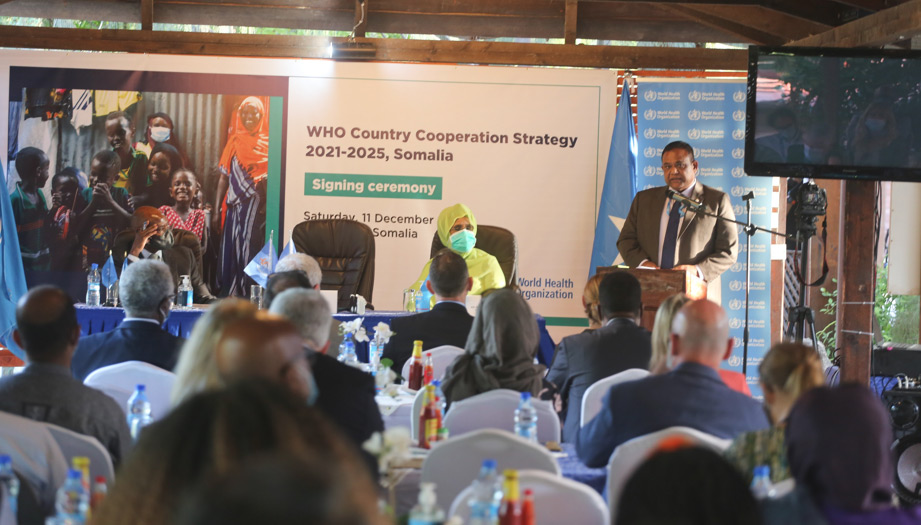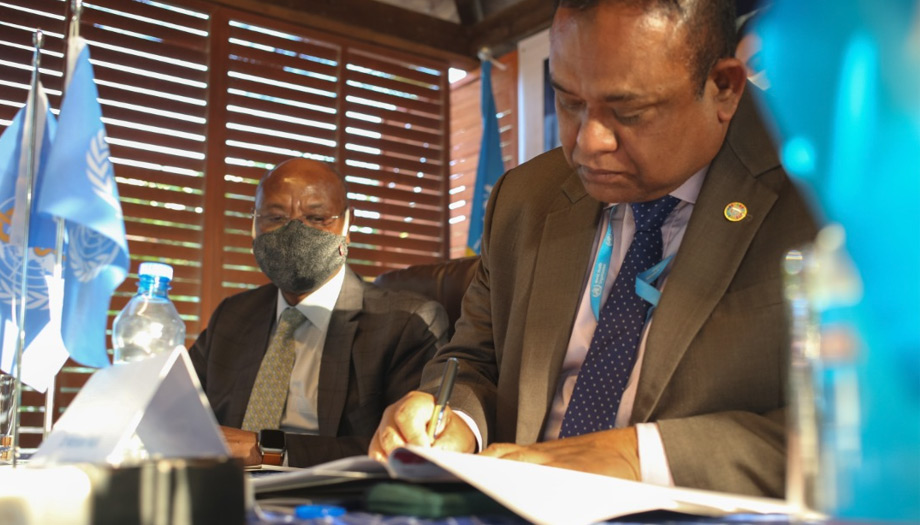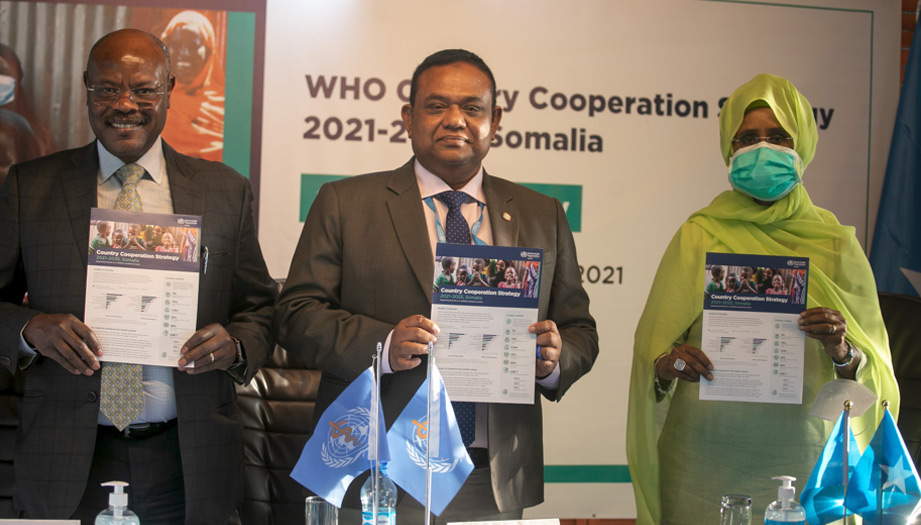
At a signing ceremony held in Mogadishu on 11 December 2021, on the eve of Universal Health Coverage Day, the World Health Organization (WHO) country office for Somalia launched its five-year Country Cooperation Strategy (CCS), 2021–2025, for Somalia, which will guide its health programme over the next five years in line with national development priorities. Dr Mamunur Rahman Malik, WHO Representative to Somalia and Head of Mission, presided over the event and signed the strategy which was co-signed by HE Dr Fawziya Abikar Nur, Minister of Health and Human Services of the Federal Government of Somalia, and Mr Adam Abdelmoula, Deputy Special Representative of the Secretary General (DSRSG) and United Nations Resident and Humanitarian Coordinator for Somalia.
The Ambassadors of Italy and the United Kingdom, and other Heads of Mission and senior officials from the European Union Delegation and United States of America and were amongst the dignitaries who attended this milestone event. Senior representatives and heads of United Nations agencies in Somalia, including the Food and Agricultural Organization (FAO), International Organization for Migration (IOM), United Nations Children’s Fund (UNICEF), United Nations Development Programme (UNDP), United Nations High Commissioner for Refugees (UNHCR), United Nations Office for the Coordination of Humanitarian Affairs (UNOCHA) and United Nations Office on Drugs and Crime (UNODC) also attended the ceremony.
While describing the mutual trust and spirit of collaboration that Somalia’s Federal Ministry of Health and WHO share, Dr Fawziya Abikar Nur said, “The Somali Federal Government has embarked on the implementation of a transformative agenda aimed at rebuilding its health system to achieve universal health coverage and improve health security. In line with their mandate, our trusted partner WHO is helping us strengthen our public health functions and our stewardship role to advance the health and well-being of the Somali people. The WHO’s Country Cooperation Strategy has been launched at the right time to help our country provide the right technical leadership and stewardship to achieve our vision of Health For All.
One of the first WHO country offices to launch its CCS since the onset of the COVID-19 pandemic
As one of the first few WHO country offices across the world to launch its CCS since the onset of the pandemic, WHO is demonstrating its commitment to supporting the health system of one of the most fragile and vulnerable countries in the world to recover from one of the worst national and global public health crises of our lifetimes. The CCS for 2021–2025 aims to support and rebuild the health system of Somalia to be more resilient, inclusive and responsive, so that everyone, everywhere, in the country can access quality health care services without any financial hardships. The timing of launch of the CCS, its strong focus on rebuilding the health system and the boldness shown by the country office in launching the strategy during the pandemic have been hailed by all partners and donors as a landmark achievement by WHO.

“We chose to launch this strategy and do other normative functions. Not because this has been easy, but because this was challenging, and because this will showcase our intent, our Organization’s vision and our goals when the country needs us the most. This strategy will test our energies and skills and measure the impact that we create,” Dr Mamunur Malik said at the CCS launch event.
Aligned with Somalia’s national health and development goals, the CCS is a tool to implement the WHO’s Thirteenth General Programme of Work 2019–2023 (GPW 13) that aims to drive progress in health at the country level, in unison with ministries of health.
Acknowledging that the CCS complements the United Nations Sustainable Development Cooperation Framework (UNSDCF), Mr Adam Abdelmoula, reiterated the support of United Nations agencies for both WHO and the Federal Ministry of Health to ensure that good-quality, accessible and equitable health services are available to improve the health of all Somalis.
Supporting Somalis towards a healthier, more productive future
WHO Somalia’s CCS, which algins with GPW 13, aims to “support Somalis to a healthier, productive future” and rests on four main strategic priorities: advancing universal health coverage (UHC) through primary health care to support the goals of integrated health services; enhancing health security by strengthening emergency preparedness, surveillance and response; promoting healthier populations and well-being by addressing the social determinants of health; and strengthening health governance using the Global Action Plan for Health and Well-being for All (GAP) to support joint and collective actions to achieve the health-related Sustainable Development Goals (SDGs).
The CCS will support the government to advance its agenda of attaining UHC, so that more people will have equitable access to essential health services without having to suffer financial hardship – Somalia’s UHC index is currently just 25 out of 100, as compared to the global average of 68 out of 100 in 2019.
The CCS will help to better ensure that initiatives undertaken will improve the lives of Somali populations of all ages and backgrounds, no matter where they live across the country. The overall improvements in access to health will have profound effects on economic growth and productivity, as well as on peace and development.
Serving Somalis of all ages no matter where they live

T
To serve children – Somalia future leaders – the CCS will scale up childhood immunization coverage in the country. By spending US$ 7 per child, the CCS will aim to fully vaccinate all vulnerable children against all routine diseases targeted as part of the expanded programme on immunization (EPI). By delivering vaccines at household level, Somalia will be able to forge a reliable contact point between families and essential and life-saving primary health care service providers.
For mothers, community midwives will provide simple, but effective, evidence-based means for reducing infant mortality, including breastfeeding and “kangaroo” mother care, as well as encouraging both antenatal and postnatal care.
Investment in community health workers, 80% of whom are women, will ensure that Somalia reaps the benefits in health, economic growth and gender equality. Meanwhile, investments in community health workers will help close the gap in access to health services between different subpopulations and boost economic returns due to the greater productivity of a healthier population.
While focusing on three of the top 10 causes of deaths and disabilities in Somalia – noncommunicable diseases, injuries and mental health – the CCS will also invest in health and nutrition, and combatting communicable diseases. In addition, the strategy aims to steer progress in reducing the current carbon footprint of the health sector and the negative health effects of fuels used in Somalia. Furthermore, the CCS will aim to deliver on its promise, in line with its global mandate, to use sustainable, cost-effective, high-impact innovations to save lives.
WHO will continue to strengthen its existing partnerships and forge new ones, to make the right and timely investments in institutions, systems and the health workforce to ensure that the health services offered respond to everyone’s needs, values and preferences.


